Introduction
Navigating the complexities of communication challenges in children with autism requires a deep understanding and a strategic approach. Autism often brings unique hurdles in both verbal and non-verbal communication, impacting a child's ability to express needs, share thoughts, and connect with others. These challenges can range from limited vocabulary and difficulty forming sentences to struggles with understanding gestures and facial expressions.
Recognizing and addressing these issues early on is crucial for parents and caregivers, as it paves the way for more meaningful interactions and improved outcomes.
Speech therapy emerges as a powerful tool in this scenario, offering tailored interventions that significantly enhance communication skills. From improving articulation and vocabulary to fostering social communication, speech therapy empowers children with autism to engage more effectively with their environment. The integration of augmentative and alternative communication (AAC) methods, such as picture exchange systems or electronic devices, further supports language development and independence.
Moreover, the role of speech-language pathologists (SLPs) is indispensable. These professionals assess individual communication needs and collaborate closely with families to implement personalized therapy plans. Early intervention, utilizing structured play and interactive techniques, can lead to substantial gains in social skills and overall development.
This comprehensive approach ensures that every child receives the support needed to thrive both socially and academically, building confidence and fostering independence in communication.
Common Communication Challenges in Autism
Children with autism often encounter distinct interaction challenges that can significantly affect their ability to express needs, share thoughts, and engage with others. These challenges may include verbal language difficulties, such as limited vocabulary or trouble forming sentences. Furthermore, non-verbal interactions issues, such as difficulty interpreting gestures or facial expressions, are common. Some children may exhibit echolalia, repeating phrases or sentences they have heard rather than using language functionally.
Understanding these challenges is crucial for parents and caregivers to provide appropriate support. For example, evidence indicates that developmental interventions can enhance interpersonal exchanges in interactions with caregivers, tackling fundamental challenges related to autism. A new study from the University of Virginia suggests that many nonspeaking autistic individuals are literate, advocating for the exploration of written methods to unlock educational, employment, and social opportunities.
Additionally, training programs such as the POWER System for paraeducators and their supervising teachers have been created to improve interaction abilities for youngsters with intricate needs for expression. This strength-based approach emphasizes the potential of every individual, rather than focusing solely on deficits, ensuring they receive the support necessary to thrive.
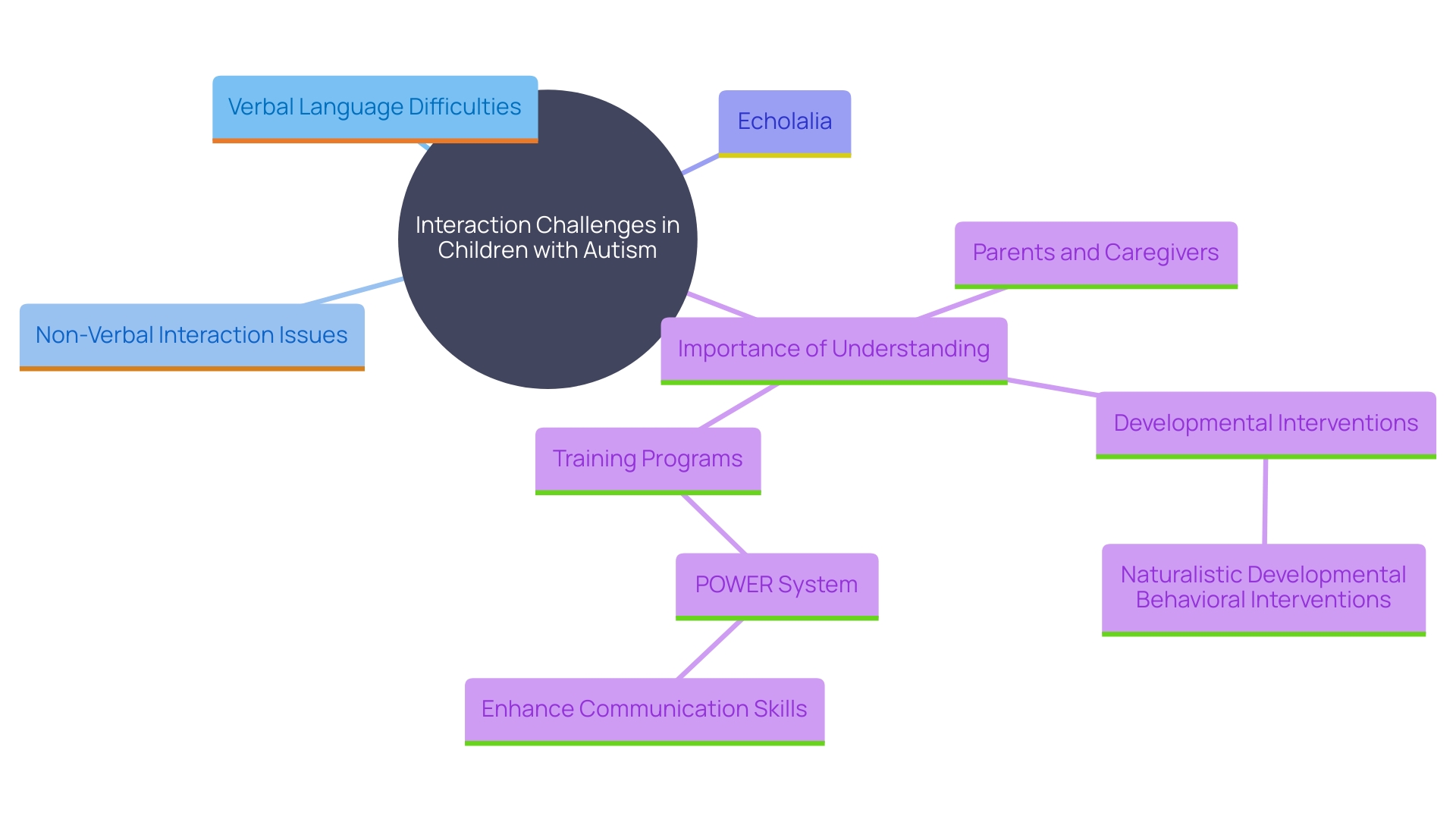
Benefits of Speech Therapy for Autism
Speech therapy provides transformative advantages for young individuals with autism, offering crucial techniques designed to improve expressive abilities. By collaborating with a speech-language pathologist, children can significantly improve their articulation, vocabulary, and sentence structure. Based on recent studies, developmental programs can enhance interpersonal interactions, especially in engagements with caregivers, which is essential since early childhood initiatives are highly advised to foster beneficial long-term results.
One notable study from the University of Virginia highlights the potential for written expression as a valuable tool for nonspeaking autistic individuals, revealing that many have developed literacy competencies despite not receiving formal instruction. This emphasizes the significance of investigating different means of interaction to unlock educational, employment, and community opportunities for these individuals. Speech therapy can also play a vital role in improving interpersonal skills, allowing youngsters to participate in discussions and connect with peers more effectively.
The overarching goal of speech therapy is to foster independence in expressing oneself, empowering children to connect with the world around them. This is backed by proof indicating that customized interventions can greatly enhance fundamental issues related to autism, including challenges with interpersonal interactions. Ultimately, effective speech therapy not only enhances language skills but also dismantles barriers to interaction, fostering social inclusion and participation.
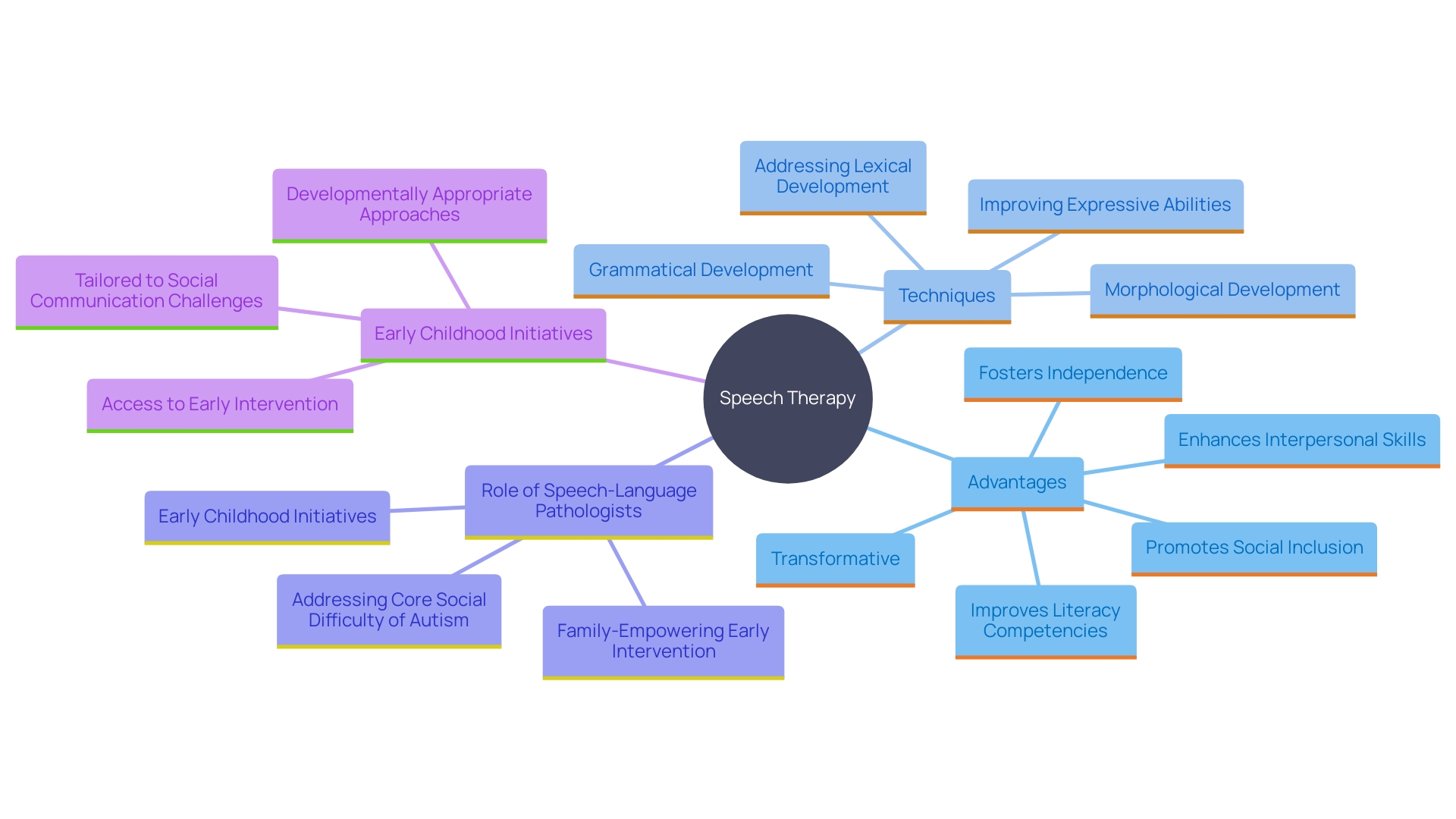
Strategies and Techniques in Autism Speech Therapy
Effective speech therapy for youngsters with autism employs a variety of strategies tailored to meet their specific needs. Methods like demonstrating suitable language, using visual aids, and involving youngsters in interactive play are very effective in promoting interaction skills. Organized habits and regular support are essential in assisting youngsters acquire new expressive abilities, as these approaches offer a stable and foreseeable setting favorable for learning.
Incorporating technology, such as speech-generating devices or apps, offers alternative methods for expression. This approach addresses personal preferences and abilities, making interaction more accessible for each child. 'Based on an extensive meta-analysis, technology-driven approaches have demonstrated considerable beneficial impacts on interpersonal interaction, with a summary effect size of 0.33, suggesting meaningful enhancements.'.
The significance of early, family-empowering actions cannot be overstated. Prompt support, especially when customized to tackle fundamental relational challenges, can result in notable improvements in interpersonal exchanges and other growth aspects. For example, naturalistic developmental behavioral strategies have been shown to enhance social communication with an effect size of 0.36, demonstrating their effectiveness in addressing core challenges associated with autism.
Moreover, the context of delivery plays a significant role in the success of these initiatives. Whether implemented at home by parents or in school settings by trained professionals, the environment can influence the outcomes. Home-based strategies, guided by parents, often create a comfortable and familiar environment for the young one, enhancing the effectiveness of the therapy.
Overall, effective speech therapy for youngsters with autism is multifaceted, incorporating various techniques and tools to support language development. By utilizing organized practices, technology, and suitable delivery settings, these strategies can greatly improve the interaction skills of youngsters with autism, opening the door to more promising social and educational prospects.
Role of Speech-Language Pathologists (SLPs) in Autism Speech Therapy
Speech-language pathologists (SLPs) play an essential role in assisting youngsters with autism, providing tailored interventions that greatly improve verbal abilities. By evaluating each child's distinct expressive skills, SLPs create individualized therapy strategies aimed at particular objectives. These professionals work hand-in-hand with families, ensuring that strategies are effectively implemented both at home and in other environments.
SLPs do not only concentrate on enhancing speech and language abilities but also on promoting interpersonal interaction and the practical application of language. By collaborating closely with parents, SLPs empower families to reinforce learning and celebrate progress. This partnership is essential, as evidence indicates that developmental support can enhance social communication during interactions with caregivers, tackling core challenges linked to autism.
Furthermore, early action is crucial for favorable long-term results, with current estimates indicating that autism impacts roughly 1-4% of the population. Pediatricians frequently suggest early childhood strategies, highlighting the significance of timely, developmentally suitable, and family-empowering methods. These initiatives aim to tackle the core social challenges of autism, equipping young individuals with the resources they need to succeed socially and academically.
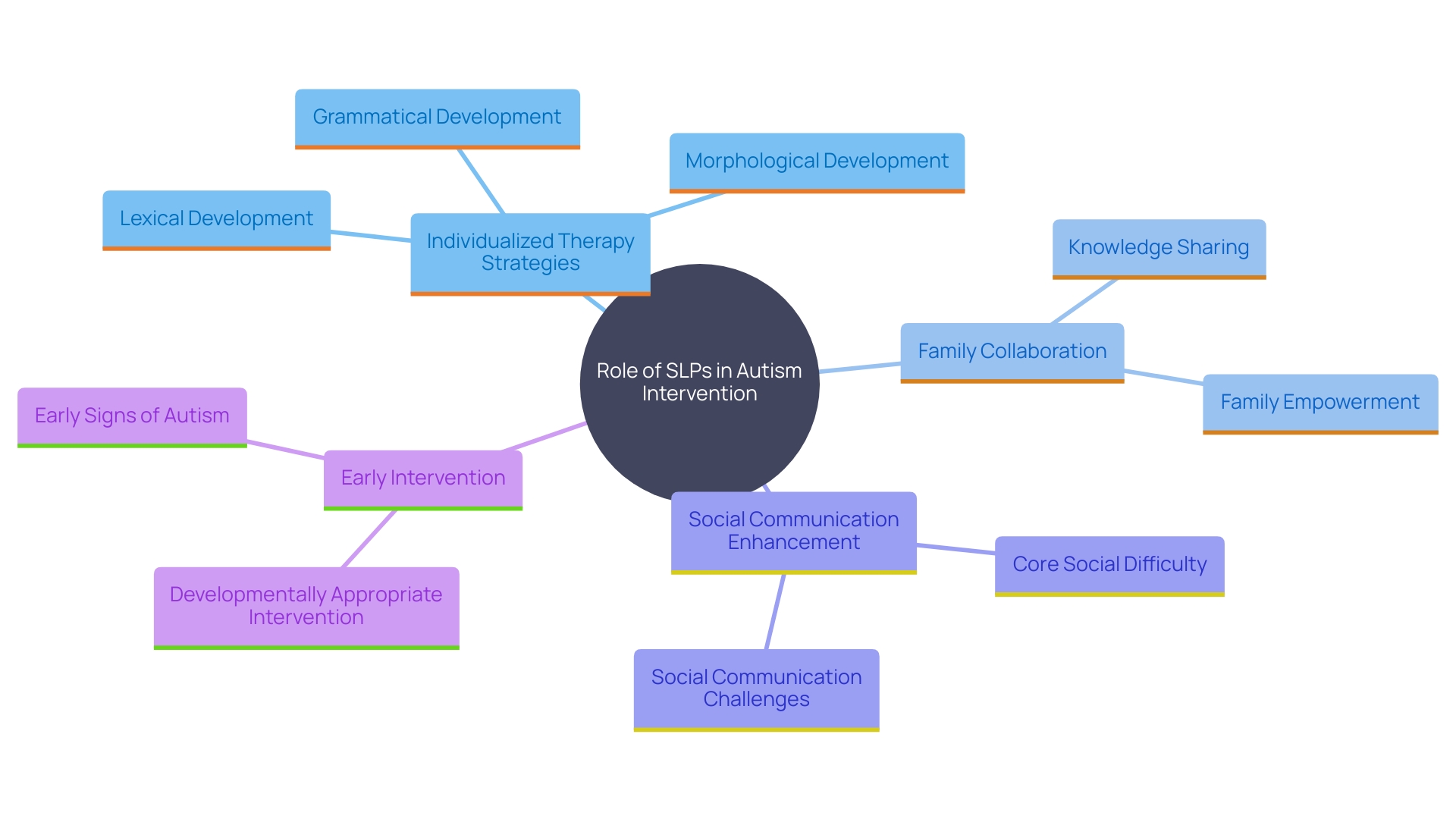
Early Intervention and Its Importance in Autism Speech Therapy
Timely support is essential for maximizing the potential of children with autism, especially in the realm of speech therapy. Research shows that starting therapy at a young age results in notable advancements in language abilities, utilizing the brain's developmental plasticity to aid in more efficient language learning. Prompt assistance not only improves social communication but also tackles fundamental challenges related to autism, such as issues in engaging with caregivers and peers. According to the Centers for Disease Control and Prevention, autism is increasingly prevalent among young children, emphasizing the urgency for prompt assessments and therapies. Experts like Micheal Sandbank, PhD, highlight the importance of understanding the landscape of evidence supporting these interventions, despite the presence of low-quality studies that complicate clinical recommendations. Parents are encouraged to seek evaluations and start therapy as soon as concerns emerge, establishing a solid basis for effective interaction and social engagement. Cooperation among speech therapists, educators, and parents is essential, providing customized, developmentally suitable strategies that empower families and support the overall development of the young one.
Augmentative and Alternative Communication (AAC) in Autism Speech Therapy
For certain individuals with autism, conventional speech may not be the most effective method of expressing themselves. Augmentative and Alternative Communication (AAC) offers alternative methods, such as picture exchange systems or electronic devices, which can aid language growth. AAC empowers young individuals to express themselves and interact with others, promoting their independence. By incorporating AAC into therapy, families can assist youngsters in developing their expressive abilities in a manner that fits their unique requirements. In fact, research by the University of Virginia highlighted that many nonspeaking autistic individuals possess literacy skills, advocating for the exploration of written forms to unlock educational and social opportunities. Additionally, professionals like speech-language pathologists (SLPs) and educators play crucial roles in implementing AAC effectively. A new grant from the Institute of Education Sciences (IES) is creating a professional development program to assist family members in utilizing AAC strategies, ensuring that youngsters with autism receive ongoing and strong support for their interactions. This cooperative method, engaging families, SLPs, and educators, guarantees that support strategies are effective and customized to each individual’s distinct requirements, ultimately promoting a richer and more autonomous way of interaction for kids with autism.
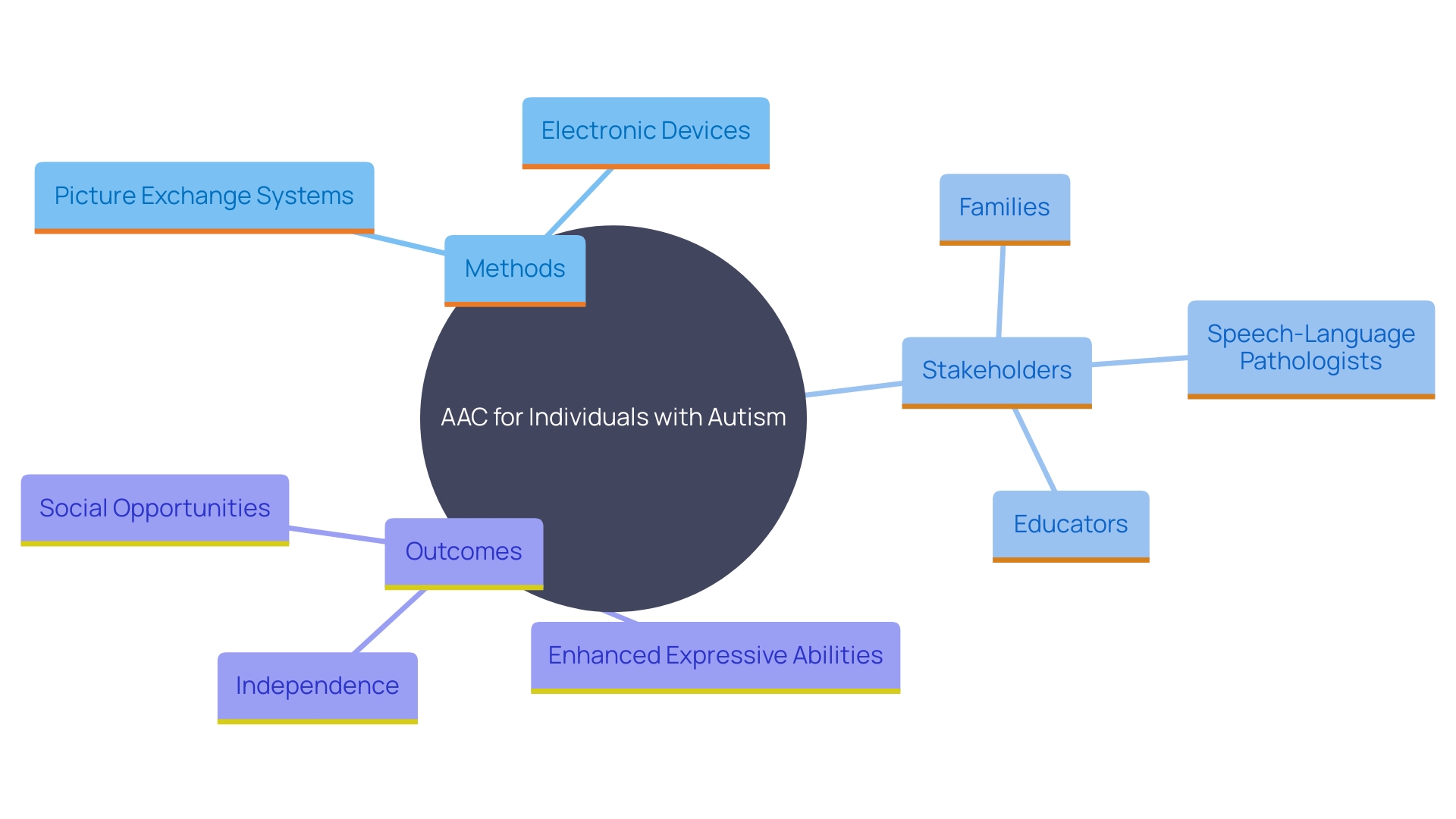
Structured Play and Social Skills Development in Autism Speech Therapy
Incorporating structured play into speech therapy greatly improves social skills development for young individuals with autism. Play-based interventions provide natural opportunities for young ones to practice communication in a fun and engaging environment. Through guided interactions, young individuals learn to take turns, share, and express emotions. This method not only aids in enhancing verbal abilities but also encourages vital interpersonal connections, enabling young individuals to form relationships with peers and family members. Studies have demonstrated that developmental programs enhance interpersonal interactions with caregivers, and naturalistic developmental behavioral strategies tackle fundamental issues related to autism, especially challenges in interpersonal exchanges. The implementation of these strategies across various parenting programs worldwide, such as in Bhutan, Rwanda, Serbia, and Zambia, highlights the global commitment to enhancing developmental outcomes for individuals with autism through play and responsive stimulation.
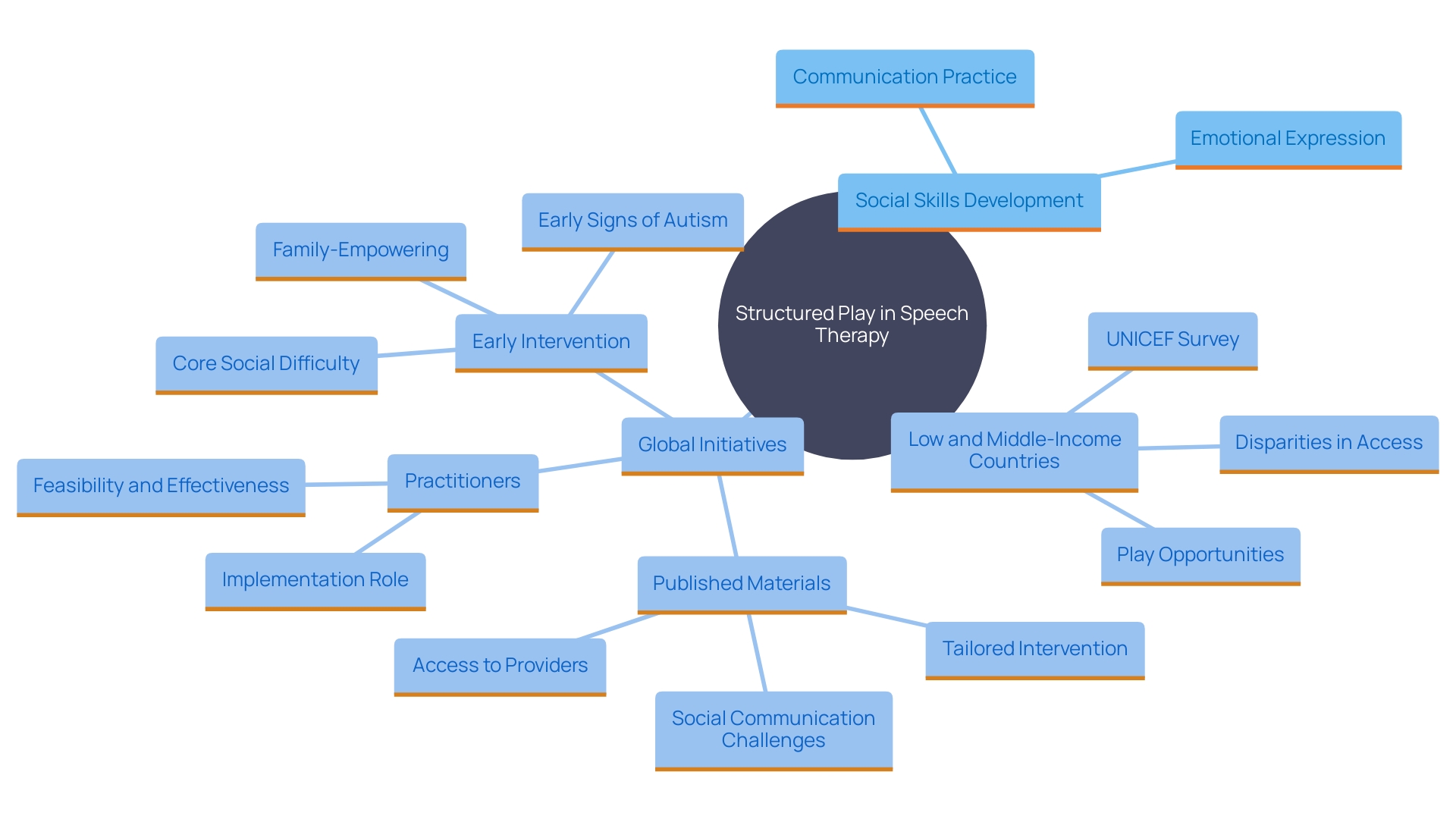
Building Confidence and Independence through Autism Speech Therapy
Trust in expressing oneself plays a crucial role in forming a young person's overall self-worth and social engagements. Speech therapy is designed to enhance this confidence by equipping young individuals with the necessary skills to express themselves more effectively. As young individuals advance in their speech therapy journey, they experience a sense of accomplishment, which encourages them to further explore their communication abilities. This growth not only benefits the young one but also strengthens family bonds by enabling more meaningful conversations.
Studies emphasize the significance of early action in tackling the fundamental challenges related to autism. Developmental strategies have been demonstrated to enhance interpersonal interactions, particularly when customized to the specific requirements of young individuals with autism. Dr. Hannah Schertz highlights the importance of parental mediation in early intervention, mentioning that it focuses on interaction skills, a basic difficulty for kids with autism. This approach is crucial in promoting long-term language competence.
A study from the University of Virginia reveals that many nonspeaking autistic individuals possess literacy skills, despite the lack of formal instruction. This discovery indicates that examining written methods of interaction can reveal new educational and community opportunities for these individuals. Such innovative evaluation techniques highlight the potential for alternative interaction strategies, fostering greater independence and confidence in youngsters with autism.
Ultimately, speech therapy and early interventions are essential in empowering individuals with autism, enabling them to achieve better social and communication outcomes. These efforts not only enhance the well-being of the young one but also foster a more supportive and engaging environment for families.
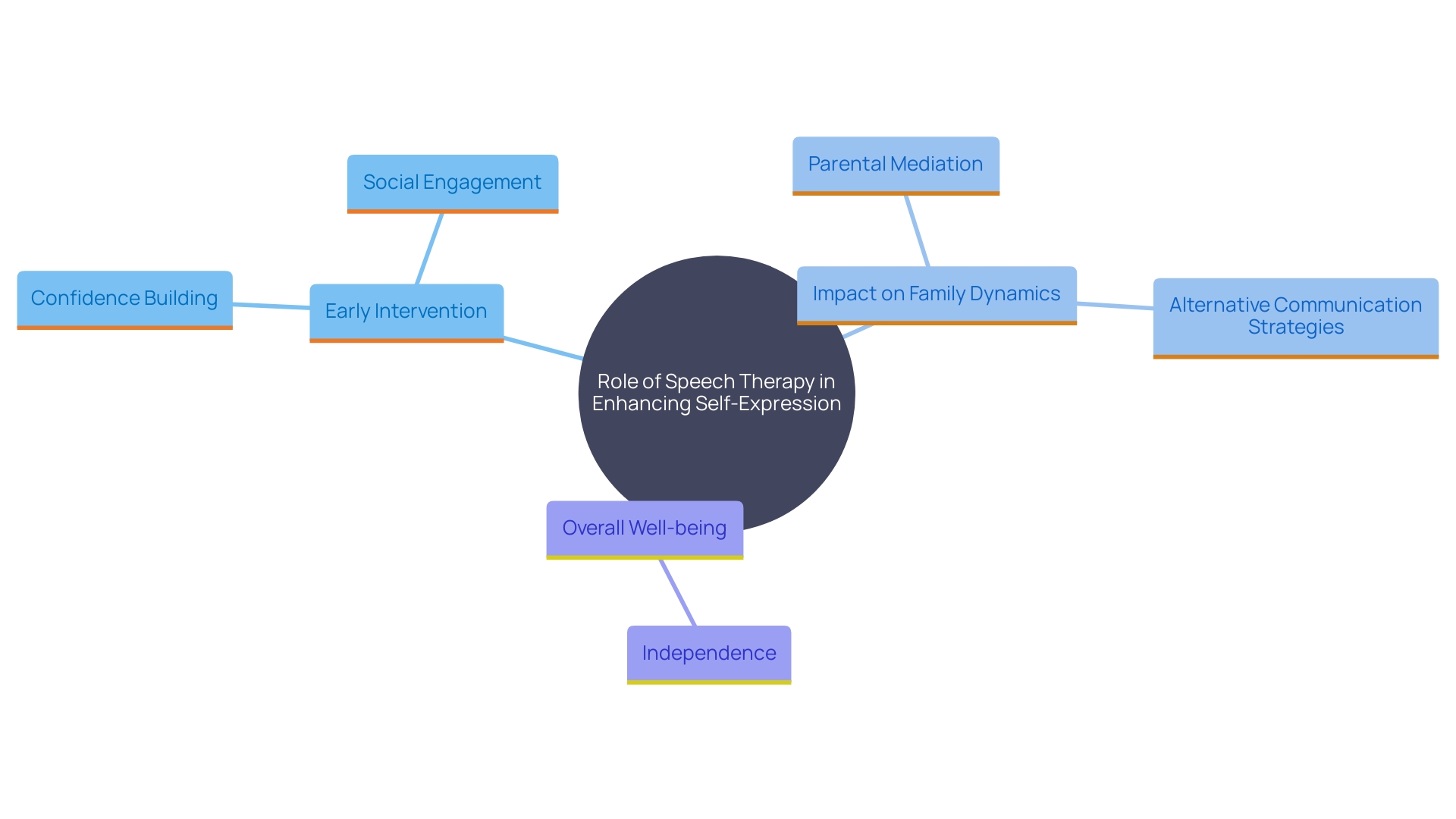
Collaboration and Individualized Therapy Plans in Autism Speech Therapy
Teamwork among caregivers, educators, and therapists is essential for creating effective personalized therapy plans for youngsters with autism. Every young individual possesses distinct strengths and challenges that necessitate a customized approach. By working together, families and professionals can share valuable insights to inform therapy goals and strategies. This collaborative method ensures that the child receives consistent support across various environments, reinforcing their learning and promoting positive outcomes. As evidence indicates, developmental programs enhance interpersonal exchanges in interactions with caregivers and tackle fundamental difficulties linked to autism. Practitioners play a key role in offering early, developmentally suitable, and family-empowering support. These interventions, when implemented effectively, can significantly enhance the social and communication skills of young children with autism.
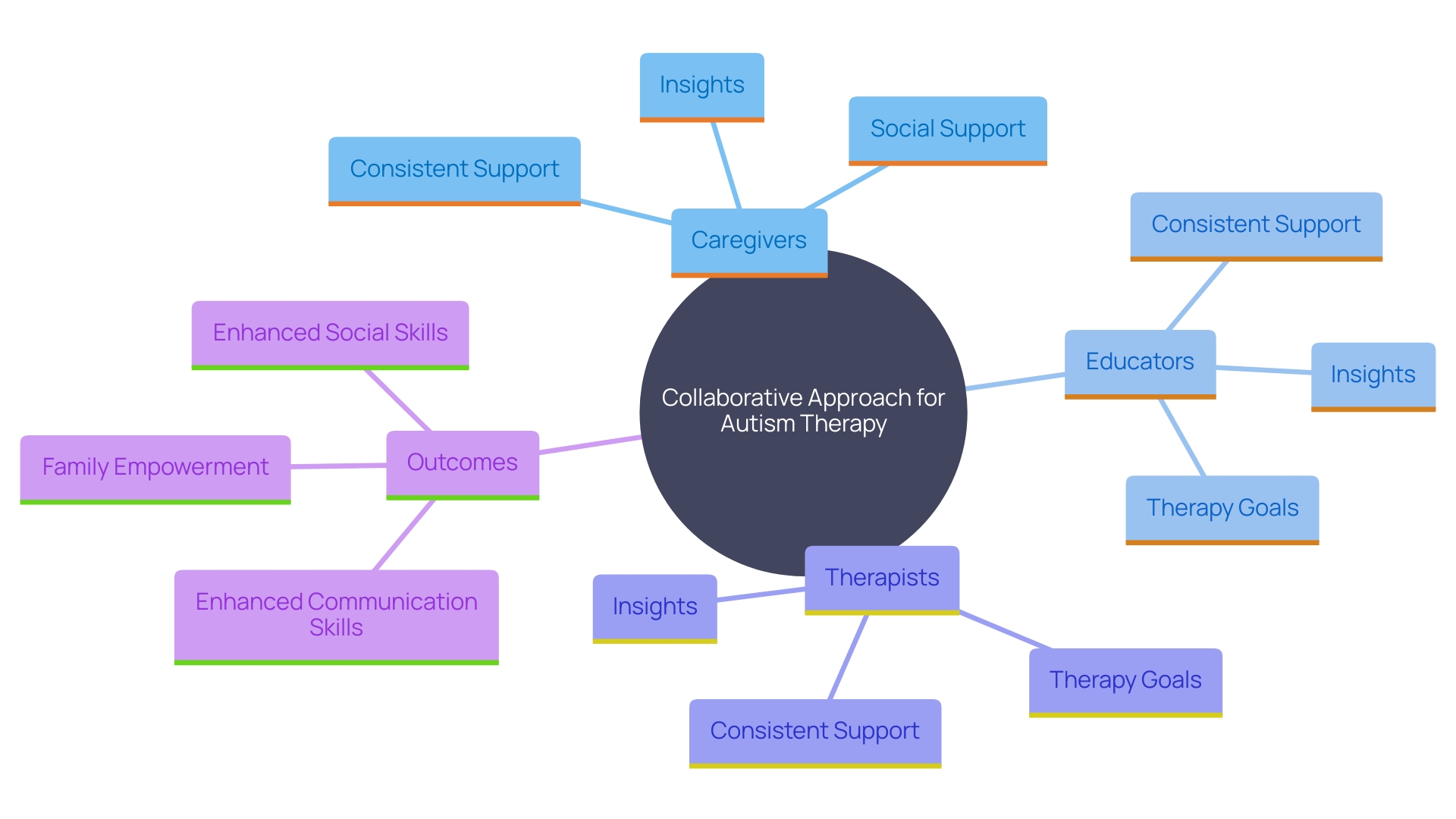
Conclusion
Addressing the communication challenges faced by children with autism requires a collaborative and informed approach. Recognizing the unique barriers—such as verbal difficulties and non-verbal cues—enables parents and caregivers to provide essential support. Speech therapy is a vital resource, offering tailored strategies that enhance articulation, vocabulary, and social communication skills, while fostering independence and confidence.
Speech-language pathologists play a crucial role in this process by assessing individual needs and developing personalized therapy plans. Early intervention is key, as research shows its effectiveness in improving core social challenges associated with autism. Through collaboration with families, SLPs ensure consistent reinforcement of strategies at home and in educational settings, promoting holistic development.
Additionally, incorporating augmentative and alternative communication (AAC) methods empowers children to express themselves and enhances their communication abilities. Structured play and social skills development further enrich learning experiences, making communication practice engaging and enjoyable.
The combined efforts of caregivers, educators, and therapists create a supportive environment that is essential for the growth of children with autism. By prioritizing individualized therapy plans and fostering collaboration, families can help their children navigate communication complexities. With the right tools and support, children with autism can thrive, finding their voice and connecting meaningfully with the world around them.




